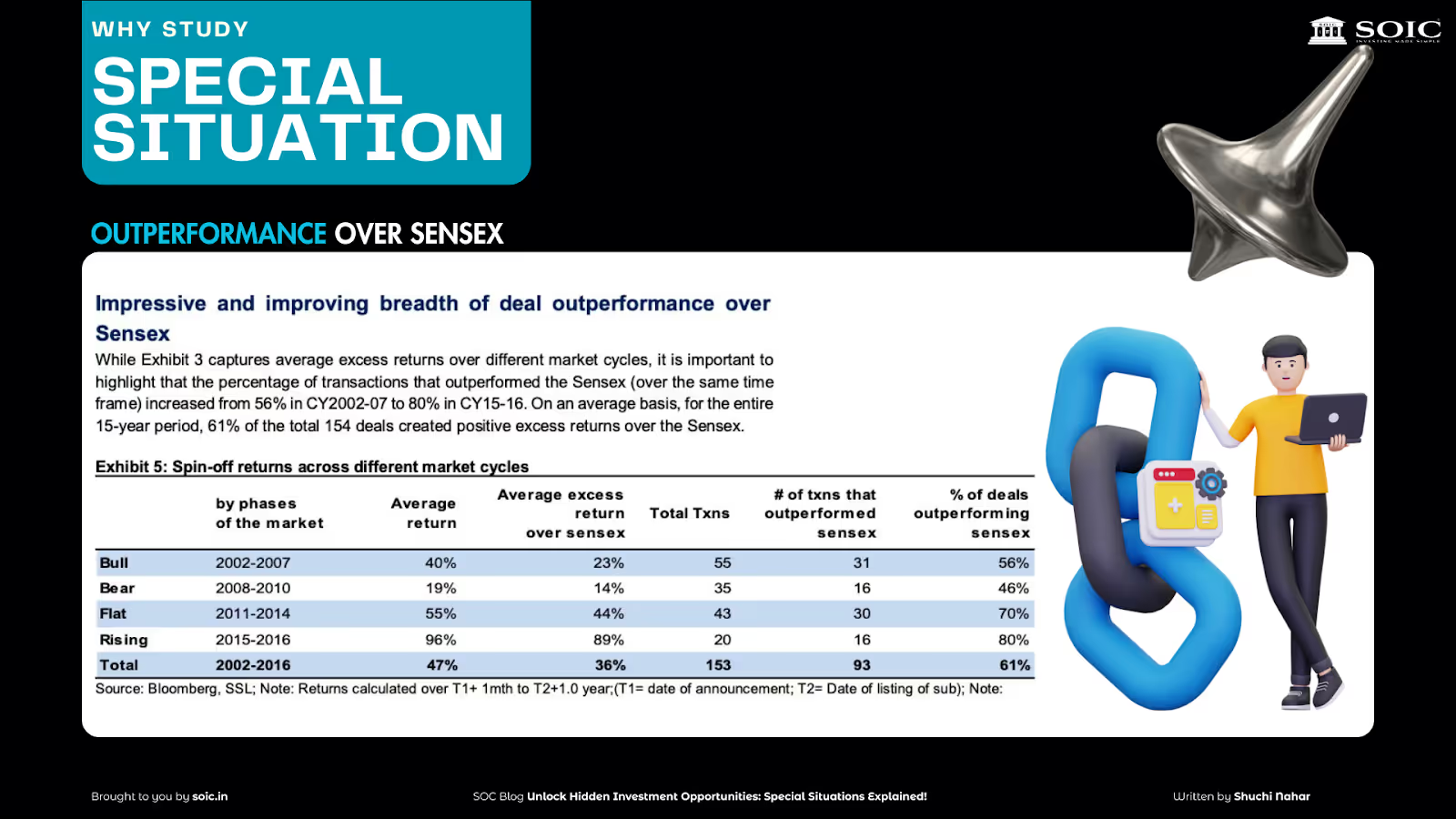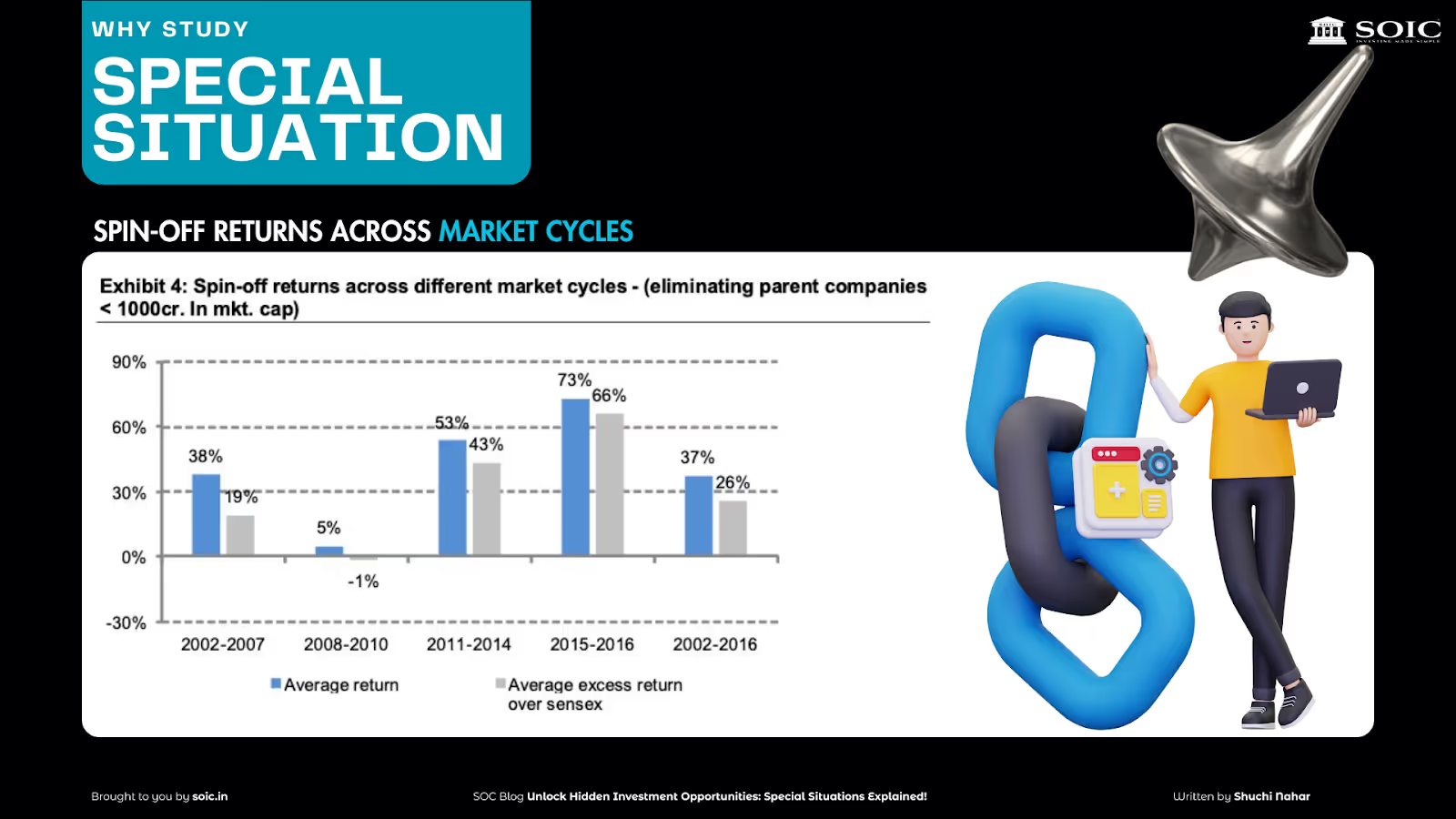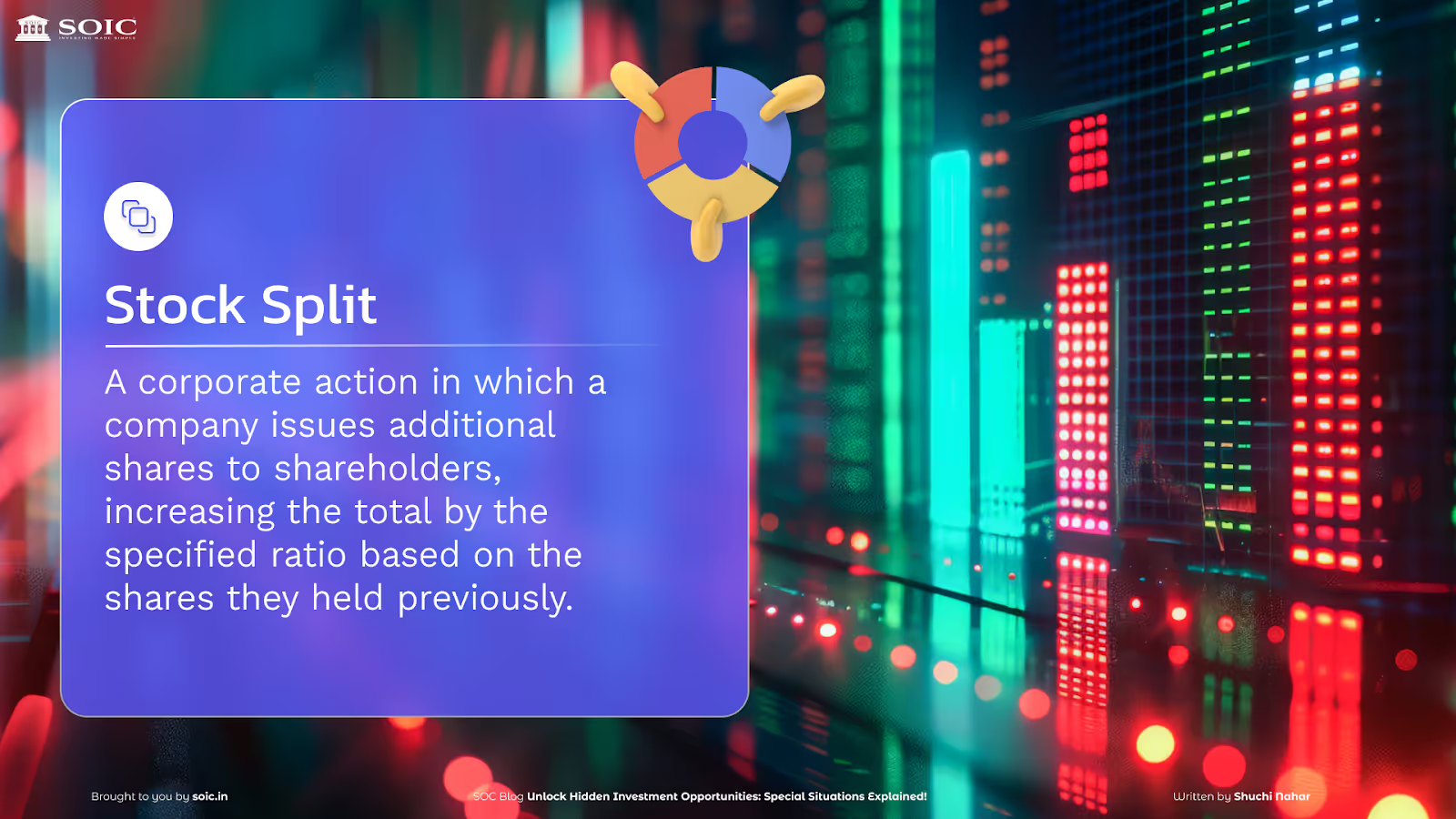.avif)
Unlock Hidden Investment Opportunities: Special Situations Explained!
Imagine yourself at a party, surrounded by friends who are chatting about their favorite board games. A game may be split into a larger, better one, certain components removed to simplify it, or its rules altered to add more excitement. Corporate actions such as stock splits, buybacks, demergers, mergers, and preferential issues are simply business decisions made by companies to grow larger, more effective, or more valuable.
Mergers? That's when two companies decide to team up like superheroes in an epic crossover episode. Demergers? Think of it as splitting up the Avengers so each hero can focus on their own storyline. Buybacks? Picture a company buying back its playing cards because it knows the deck is stacked in its favor. Preferential issues? Imagine inviting a VIP guest to the game who gets to choose their own special cards before the deck is shuffled. Companies offer shares at a special price to a select group of investors to raise funds quickly and strategically. And stock splits? Well, that's like breaking a big pizza into more slices so everyone can have a bite.
Hello Folks! So let's dive into special situations. A variety of corporate events, such as delistings, mergers, buybacks, demergers, and more, present special opportunities for investors to profit in the markets.

Here's a breakdown of some important concepts and case studies for key types of special situations:
Businesses strategically undertake mergers and demergers to maximize shareholder value. Mergers combine two companies into one, while demergers separate a company into multiple distinct entities.
Demergers are increasingly popular for their ability to unlock value, simplify operations, and improve efficiency. This analysis focuses on the performance of companies post-demerger, examining stock market growth and operational improvements.
Demergers/Spin Offs : Breaking Up for Better Focus
A demerger occurs when a company splits into two or more separate entities. This is often done to focus better on core businesses or to unlock hidden value that was trapped in a large conglomerate.
Example: In 2020, Reliance Industries demerged its oil-to-chemical (O2C) business into a separate entity, allowing it to bring in global investors and boost valuations for both the core and the new business.

Factors Contributing to the Success of Demergers:
Demerger strategies often result in the creation of specialized, focused entities that can operate independently with streamlined operations, targeted capital allocation, and clear strategic goals.
This clarity often leads to enhanced market valuations, better investor perception, and significant growth opportunities. For investors, understanding the dynamics of these demergers and the strategic pivots they enable can be key to identifying lucrative investment opportunities.
Challenges and Risks in Demergers:
While demergers can unlock value, they also come with risks. Some of these include the possibility of underperformance if the separated entities struggle, increased operational costs, and potential confusion among investors and customers in the early stages.
Strategically executed demergers can generate substantial shareholder value, as demonstrated by the stock price increases in this analysis. Key factors like a sharper focus on core operations, improved governance, and financial restructuring contribute to their success. However, careful planning and execution are essential to minimize risks and ensure long-term value creation.
2. Mergers and Acquisitions (M&A): A Play for Market Share
An acquisition occurs when one company buys another. While similar to a merger, acquisitions are usually a more aggressive move, often to eliminate competition or enter new markets quickly.
Example: Tata Motors and Jaguar Land Rover (JLR) In 2008, Tata Motors acquired the luxury car brands Jaguar and Land Rover, instantly gaining access to the premium automobile market. This acquisition diversified Tata's portfolio and helped expand its global presence.
In August 2024, IDFC Ltd merged with IDFC First Bank, simplifying the structure and creating a unified entity with a stronger capital base and clearer strategic focus. This merger is expected to drive greater synergies and operational efficiency for the combined entity.
In mid-2024, the monumental merger of HDFC Ltd and HDFC Bank was completed, creating one of India’s largest financial institutions. The combined resources enable a broader product offering and enhanced market reach, making a significant impact across the financial sector.
How can it affect investors?
3. Delisting: Going Private Again
A delisting happens when a company removes its shares from the stock exchange. This can happen voluntarily, often when the promoters want to take the company private, or involuntarily, due to non-compliance with regulatory requirements. Delisting involves a company withdrawing its shares from the stock market. Two primary patterns are profitable in delisting scenarios:
Example: Reliance Industries and its Oil-to-Chemical (O2C) Business In 2020, Reliance Industries demerged its O2C business, creating a separate entity. This allowed Reliance to focus on its fast-growing telecom and retail businesses while bringing global investors into its oil business.
What should you do as an investor?
In general, delisting offers often coincide with cyclical downturns in the industry, allowing promoters to attempt buybacks at low prices. These events typically signal optimism about future performance, offering potential for long-term gains.
4. Buybacks: A Reward for Shareholders

A buyback happens when a company repurchases its own shares from the stock market. This reduces the total number of shares available, which can increase the earnings per share (EPS) and often push the stock price higher.
Share buybacks, similarly, are efforts by companies to repurchase their own shares to return value to shareholders or reduce dilution.
Why They Matter:
Example: Infosys Buyback (2022) Infosys announced a ₹9,300 crore buyback to reward shareholders and reduce dilution, showing confidence in its undervalued stock. This is common among Indian IT companies to distribute surplus cash.
In 2023, Godawari Power & Ispat Ltd (GPIL) announced a buyback to return value to shareholders and capitalize on its strong cash flow. This move demonstrated the company's confidence in its undervalued stock and led to an immediate boost in share price, benefiting long-term investors.
Benefits for investors:
5. Rights Issue: A Chance to Buy More at a Discount
A rights issue gives existing shareholders the right to buy additional shares at a discounted price. Companies use this method to raise funds for expansion or debt repayment. Rights issues allow existing shareholders to purchase additional shares at a discount.
Strategic rights issue arbitrage involves taking advantage of the price differential between the rights issue price and the market price. Atul Auto’s rights issue was a classic example of a profitable arbitrage opportunity, where investors could secure shares at a substantial discount.
Example: Bharti Airtel (2021) Bharti Airtel launched a ₹21,000 crore rights issue to fund its 5G expansion. Existing shareholders could buy additional shares at a discounted price, making it a profitable opportunity.
What’s in it for you?
6. Bonus Shares: Free shares for existing investors
Bonus shares are free shares that a company gives to its existing shareholders, based on how many shares they already own. It’s a way for companies to distribute their profits without paying cash dividends.
Example: TCS (2022) announced a 1:1 bonus issue, where every shareholder received an additional share for each one they held, effectively doubling their shareholding without any extra cost.
How does it work?
7. Stock Splits: Making Shares Affordable

A stock split is when a company increases the number of its shares while reducing the price proportionately. This makes shares more affordable for retail investors but doesn’t change the company’s market capitalization (total value).
Example: Wipro (2019) Wipro split its shares in a 1:3 ratio, making the shares more affordable for small investors, increasing liquidity, and boosting interest in the stock.
VBL (Varun Beverages): One of the largest PepsiCo bottlers, VBL split its stock in a 1:2 ratio in 2023. The split was aimed at making the stock more accessible to retail investors, boosting liquidity and overall market participation.
PG Electroplast: A key player in electronics manufacturing, PG Electroplast announced a stock split in 2022, reducing its share price to encourage wider retail participation and improve trading volume.
For the investor:
8. Preferential Issue: Selective Fundraising for Quick Capital
When a business issues shares or convertible securities, usually at a predetermined price, to a particular group of investors, it is known as a preferential issue. Without using the public offering procedure, this strategy is used to swiftly raise capital from promoters, institutional investors, or strategic partners.
Example: Adani Enterprises (2023)
Through a preferential issue in 2023, Adani Enterprises raised ₹2,500 crore by selling shares to a select group of investors, which included institutional players and promoters. As a result, the business was able to effectively raise capital for its expansion plans, giving these investors the opportunity to purchase shares at a mutually agreed-upon price.
What’s in it for investors?
However, retail investors should note that preferential issues may dilute existing shareholding if the total number of shares increases, unless the company's growth justifies this dilution.
Special situations in the Indian market, such as mergers, demergers, buybacks, and stock splits, can offer unique opportunities for investors. These corporate actions often reflect underlying value creation, and savvy investors can profit by staying informed and understanding the implications of each event.
Investing in the stock market can feel a bit like playing a strategy game—full of twists, turns, and exciting opportunities. Buybacks are like companies saying, “Hey, we believe in ourselves!” Delistings are when they quietly sneak off the dance floor, but only after offering a great exit deal. Rights issues? It’s like getting an exclusive invite to buy more of something you already love at a discounted price.
Preferential issues? Well, that’s when a company gives special access to the VIPs at the table, offering shares to a select few at a special rate to raise money quickly, helping the company grow while giving these investors a sweet deal. And who doesn't love free bonus shares? That’s just like being handed extra scoops of your favorite ice cream.
So, whether you’re new to the game or a seasoned player, keeping an eye on these special situations can help you spot some winning moves. Just like in any game, strategy is key – and in the stock market, knowing when to make the right move can lead to exciting rewards. Keep your eyes peeled for these corporate actions, and who knows? Your next big win might just be one special situation away!

Link to our Special Situation Video: Special Situation Investing Decoded for Multibaggers 🎁
Please share your feedback with us in the comments section below.
Disclaimer: The information provided in this reference is for educational purposes only and should not be considered investment advice or a recommendation. As an educational organisation, our objective is to provide general knowledge and understanding of investment concepts. We are SEBI-registered research analysts.
It is recommended that you conduct your own research and analysis before making any investment decisions. We believe that investment decisions should be based on personal conviction and not borrowed from external sources. Therefore, we do not assume any liability or responsibility for any investment decisions made based on the information provided in this reference.
0 Comments